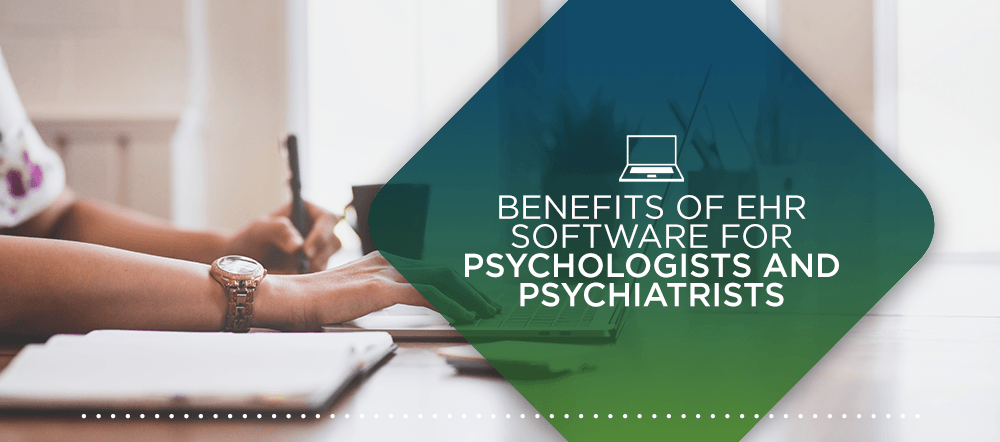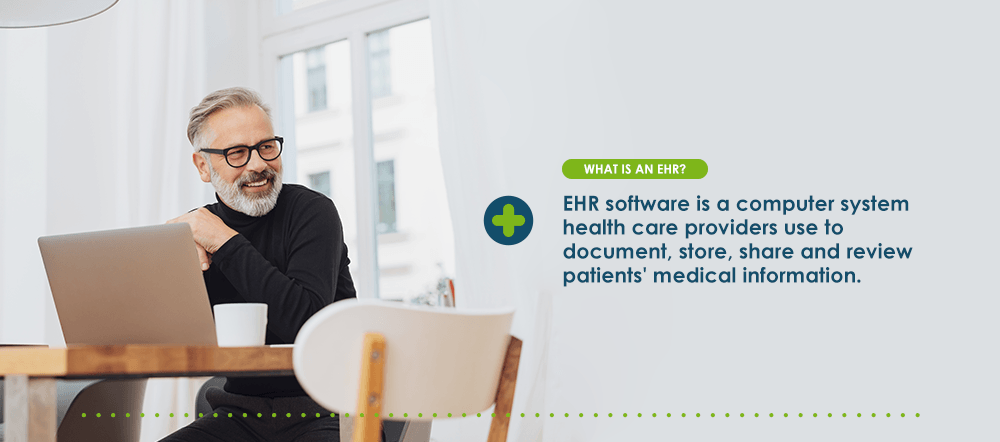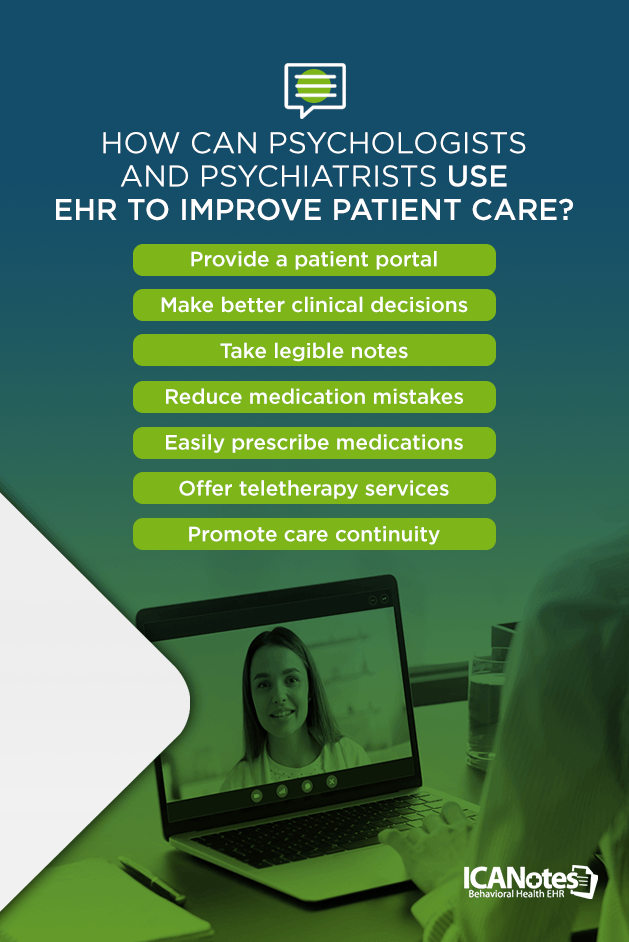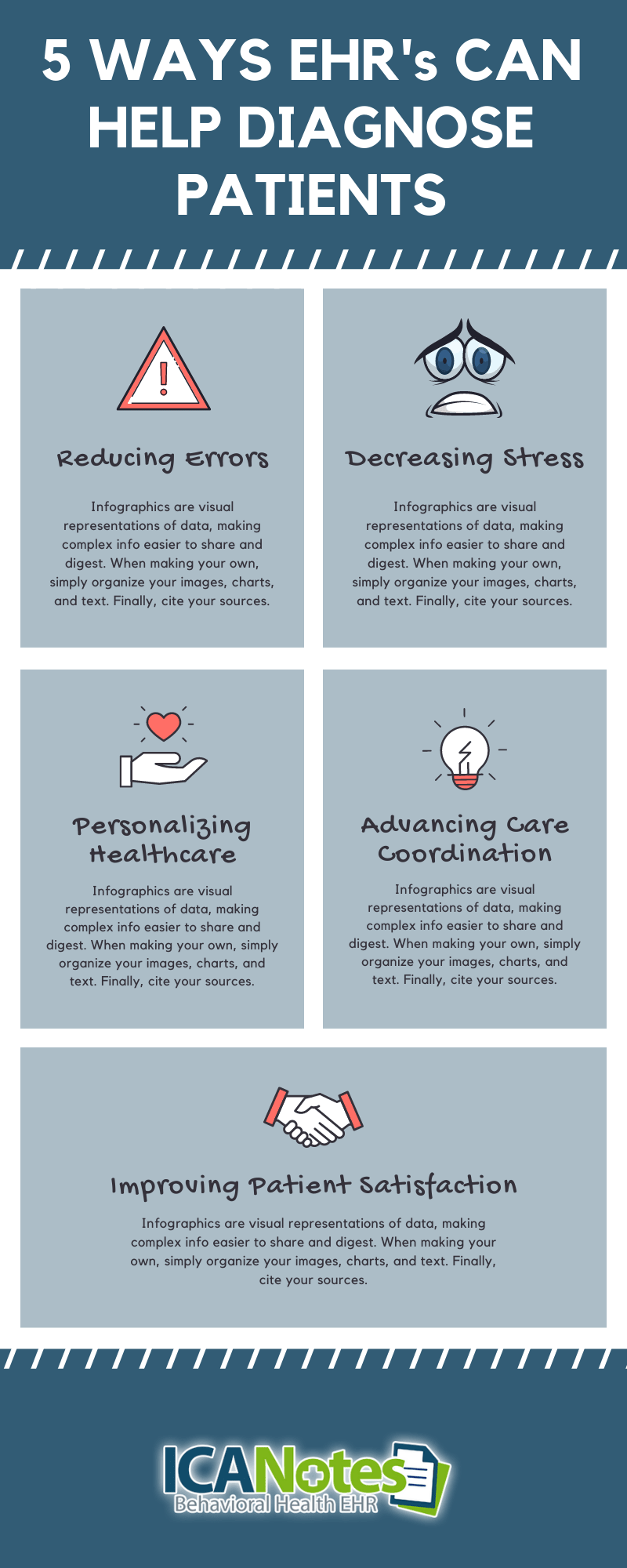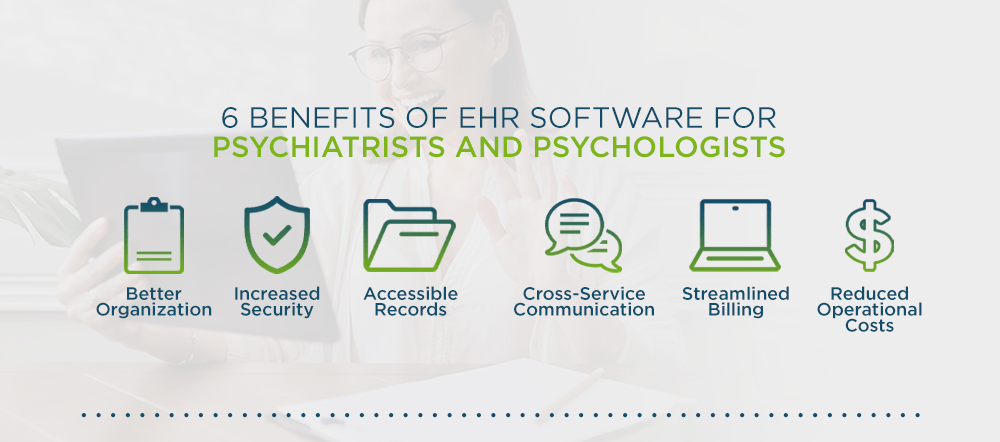Top 6 Benefits of EHR Software for Psychologists and Psychiatrists
Electronic health record (EHR) software is commonly utilized in doctor's offices and hospitals across the United States, and it's becoming more of a necessity. According to the Office of the National Coordinator for Health Information Technology (ONC), 96% of hospitals and 75% of office-based physicians use an EHR system.
EHR technology has many benefits, such as improving patient care and satisfaction. For example, according to the ONC, 75% of health care providers claim their EHR enables them to deliver improved patient care, and 88% report their EHR contributes clinical benefits to their practice.
Behavioral health professionals have been slower to adopt EHRs compared to other health care providers. According to the National Electronic Health Records Survey from 2015, 61% of psychiatrists used EHR or electronic medical record (EMR) systems, versus approximately 90% of primary care physicians. Common barriers to EHR adoption in the mental health field include concerns over patient privacy, confidentiality and policies. However, the benefits of using an EHR system often outweigh the challenges.
If you're a psychologist or psychiatrist considering using EHR software in your practice, we're excited to explore its benefits with you. In this post, we'll show you the reasons to implement an EHR system and provide tips for choosing the right software for your practice.
Table of Contents
- What Is an EHR?
- How Can Psychologists and Psychiatrists Use EHR to Improve Patient Care?
- 6 Benefits of EHR Software for Psychiatrists and Psychologists
- Choosing the Right EHR Software for Your Practice
- Try ICANotes EHR Software for Behavioral Health
What Is an EHR?
EHR software is a computer system health care providers use to document, store, share and review patients' medical information. In a behavioral health setting, an EHR may contain clients' progress notes, treatment plans, medical histories and other relevant information. EHRs typically feature customizable note-taking templates, which allow providers to take accurate progress notes quickly after sessions with clients.
It's easy to think of an EHR system as a digital version of a practice's paperwork. However, EHR technology goes beyond the typical paperwork filing system. Depending on the EHR you choose, it may also offer features such as a telehealth platform, which enables you to treat patients remotely, and a patient portal, which allows clients to manage their appointments and be more involved in their health care. Comprehensive EHR systems, like ICANotes, also feature billing integrations to help you submit paper or electronic claims to clients' insurers.
EHR software may be hosted locally on computers in a practitioner's office or remotely using an internet-based system. An internet-based EHR system is fast and easy to install on a computer or mobile device, and allows you to access patient records securely no matter where you are. Web-based EHR software also decreases upfront hardware and software installation costs and requires less maintenance.
Regardless of whether you select an internet-based system or install the necessary hardware and software on your office's computer, an EHR offers many advantages because it:
- Gives you instant access to patients' data in real time.
- Allows you to securely share patient information with other physicians to improve care coordination.
- Promotes legible and accurate documentation.
- Streamlines coding and billing.
- Increases privacy of patients' records.
- Reduces duplicate testing, paperwork and related costs.
- Boosts productivity, efficiency and work-life balance.
- Improves communication with patients.
- Enables better decision-making by pulling patient data from multiple sources.
Overall, EHR software allows you to streamline your workflow and improve patient care.
How Can Psychologists and Psychiatrists Use EHR to Improve Patient Care?
According to the National Survey on Drug Use and Health, nearly 52 million American adults experienced a mental illness in 2019. Approximately 55% of adults with any mental illness did not receive mental health services during that period. Americans need greater access to quality mental health care, and EHR systems can help health care professionals fill gaps in their communities. Here's how EHR software can help you provide better care and promote patient engagement:
- Provide a patient portal: You can use EHR software to keep clients engaged with a patient portal. For example, clients can use the EHR's patient portal to confirm or cancel appointments online. They can also use the portal to review important information from their appointment or request medication refills. All these features make it more convenient for clients to manage their care.
- Make better clinical decisions: EHR systems allow you to instantly exchange patient information with other health care providers, such as primary care physicians. You can use the information that other clinicians share with you to quickly learn about a client's history and current medications, make informed decisions and treat the patient on a holistic level.
- Take legible notes: Using an EHR system requires you to type and click on data rather than handwrite notes. This prevents the creation of illegible notes, which could lead to miscommunication between health care providers and staff members and put a patient's safety at risk. By taking clear, easy-to-read notes in an EHR, you improve communication among all staff members and providers and promote accurate coding and billing.
- Reduce medication mistakes: EHR systems are designed to enhance patient care and safety through automatic processes. For example, an EHR system might automatically scan a patient's medication records and warn the clinician of any potential issues when they prescribe something new. This can protect patients from experiencing potentially dangerous drug interactions. Lastly, an EHR may provide you easy access to your state's prescription drug monitoring program.
- Easily prescribe medications: EHR software makes it easy for you to prescribe medications electronically. EHRs also make it more convenient for patients to get their prescriptions filled. According to study results presented by the ONC, 76% of patients reported that EHRs make it easier to obtain medications. Ninety percent claim they rarely or occasionally find their prescriptions are not ready when they go to the pharmacy.
- Offer teletherapy services: You might use your EHR system to run a secure teletherapy platform. Teletherapy, which may also be called virtual or online therapy, allows clients and physicians to meet via video conferencing. With teletherapy capabilities, you can reach clients who live in remote areas, lack transportation or have physical disabilities that make it difficult to leave their homes.
- Promote care continuity: If you leave your practice, go on vacation or cannot provide care for any other reason, your patients do not have to start all over again with a new provider — thanks to an EHR system. A new provider can pick up where you left off by quickly accessing their health history through their EHR.
6 Benefits of EHR Software for Psychiatrists and Psychologists
EHR software can have a positive impact on patients' health and motivation to continue treatment. When client satisfaction goes up, clinicians can expect to feel more fulfilled and eager to keep their practice going. Besides providing improved patient care and enjoying its rewards, EHR software offers many other advantages for psychologists and psychiatrists. Here are six benefits of using EHR software for mental health services:
1. Better Organization
As a behavioral health professional, you likely have a ton of paperwork to keep track of. You may have various assessments, progress notes, intake forms and other types of patient documentation to store in your office. EHR software allows you to keep all these documents in one place and eliminates the need for file cabinets. You can even scan paper documents into your EHR and run a paperless practice if you wish.
2. Increased Security
EHR software includes advanced security features to protect patient information and keep you compliant with privacy laws. Security features might include data encryption, user authentication and a range of access controls. With EHR, you can keep track of who accessed clients' records and set up security alerts.
Unlike paper documents, you don't have to worry about patients' records getting destroyed in fires, floods or other disasters when you use a secure, cloud-based EHR system. You also don't have to worry about paper records getting lost in the office or on their way to another provider. Everything happens electronically when you use an EHR system, including sending and receiving referrals.
With EHR software, you can treat clients with confidence and peace of mind knowing you're compliant with state and federal privacy laws. You can also maintain confidentiality that's vital to your relationship with clients.
3. Accessible Records
EHR software enables easy and fast access to a client's health information, enabling you to make quick decisions. As the ONC reports, 94% of health care providers say that records are readily available with their EHR.
You can review a patient's documentation anywhere you have internet access if you choose a web-based EHR service. This means you can check patient's files at home or when you're out of town — whenever it's convenient for you. You and your staff members also do not have to waste time and energy digging through paper files to locate critical information or use a specific computer to access paperwork. With an EHR, you can view client notes from a mobile device if you want to, and everything you need will be at your fingertips.
4. Cross-Service Communication
Many individuals with a mental health issue also have a physical illness. For example, according to the National Institute of Mental Health, depression is common among patients who have a chronic illness such as cancer or diabetes. Also, people with depression are at higher risk of developing a medical condition like cardiovascular disease.
To provide a more accurate diagnosis and better patient care, good communication with a client's family doctor and other health care professionals is crucial. An EHR system promotes seamless communication between providers and keeps you from having to play phone tag.
5. Streamlined Billing
EHR software makes it easier to fill out and submit insurance claim forms electronically. You and staff members do not have to search for the paperwork needed to fill out claims accurately because everything is stored in one place. You can create superbills, customize statements and process payments with your EHR, which can save time and help you get paid.
Also, some EHR systems offer automatic coding capabilities. Automatic coding can help you get reimbursed at the maximum rate.
6. Reduced Operational Costs
Implementing an EHR system can potentially save your practice money. When you use an EHR system's automated tools and customization options, you can optimize workflow and save on administrative costs. EHRs can also increase cost savings by reducing duplicate testing, improving coordination of care and decreasing medication errors.
For example, consider a study published in The American Journal of Managed Care. According to the study, patients who were treated in hospitals that used advanced EHR systems cost nearly 10% less than individuals who were treated in hospitals that did not implement advanced EHRs.
Choosing the Right EHR Software for Your Practice
When it's time to choose EHR software for your practice, you'll need to consider several different factors. First, some EHR software is designed specifically for psychologists, psychiatrists and other behavioral health professionals. ICANotes, for example, was designed by a psychiatrist for the mental health field. ICANotes includes clinical content and customizable templates for every sector of behavioral and mental health to simplify documentation tasks.
No matter what type of EHR software you choose for your practice, be sure to consider the following elements:
- HIPAA compliance: Your EHR system needs to be compliant with the Health Insurance Portability and Accountability Act (HIPAA). Under the HIPAA Privacy Rule, clinicians must ensure the appropriate electronic safeguards are in place to protect patients' health information. To choose a HIPAA-compliant EHR system, it helps to look for software that's ONC-certified.
- Structured data: According to the Centers for Medicare and Medicaid Services, EHR software should store data in a structured format that allows all health care providers to easily retrieve and transfer patient information. Select EHR that can help your office run more efficiently and communicate with health care providers easier, so you can improve patient care. Also, consider whether you want EHR that allows you to keep clients' mental health records separate from medical records.
- Client access: With a few exceptions, clients have a right to access their health information under HIPAA. It's best to choose an EHR system that's easy for clients to access and use, whether from their computer or mobile device.
- Storage: Consider whether you want your EHR to store information on the internet or on your office's computer. Local storage and cloud-based storage both have pros and cons worth considering. For example, if you don't feel comfortable having patient data stored on the web, you might choose to keep information on a server located within your office building. However, cloud-based storage may be a more viable option for smaller practices due to reduced upfront and maintenance costs.
- 21st Century Cures Act compliance: Beginning April 5, 2021 all clinicians are required to make their notes virtually accessible to the patient. Certified EHR software is required to include this feature. Even if your EHR software is not certified, as a clinician, you are still required to share your notes with your clients. Choosing a high-quality EHR software with this feature included will ensure your practice is compliant and efficient.
Before you purchase an EHR system, ask the company if you can try the software first. That'll help you experience the different features and determine if it's right for you and your practice.
Start a Free Trial
Try ICANotes EHR Software for Behavioral Health
Many of today's transactions and communications take place electronically. As more health care providers adopt EHR systems, patients will expect to have digital access to their records, including their mental health documents. As a psychologist or psychiatrist, using EHR software can help you increase patient satisfaction, boost efficiency in your practice and make your job easier overall.
At ICANotes, we understand that choosing an EHR for your behavioral health practice can be challenging, but we're here to help you make the transition. We invite you to try ICANotes EHR for free and see how it works, or contact us for more information.
Related Posts
3 Ways a Specialty-Specific EHR Benefits Your Mental Health Practice
How EHR Systems Can Help You Diagnose Patients
How to Train Your Staff on Using an EHR
Sources:
- https://www.healthit.gov/playbook/electronic-health-records/
- https://www.healthit.gov/topic/health-it-basics/benefits-ehrs
- https://www.healthit.gov/topic/health-it-and-health-information-exchange-basics/improved-diagnostics-patient-outcomes
- https://www.cdc.gov/nchs/data/ahcd/nehrs/2015_nehrs_ehr_by_specialty.pdf
- https://www.ncbi.nlm.nih.gov/pmc/articles/PMC4558322/
- https://www.advancedmd.com/emr-ehr-software/
- https://www.healthit.gov/faq/what-electronic-health-record-ehr

